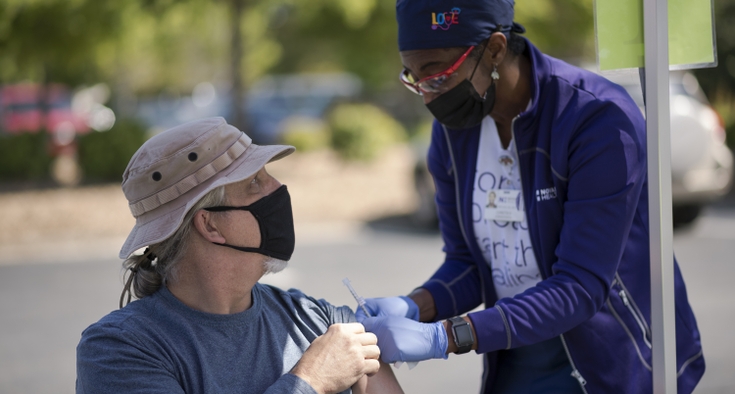Just when we thought COVID-19 was in our rearview mirror, the positivity rate jumped over the last few weeks from 2% to 16% across the Novant Health footprint. The dramatic rise in cases led to an increase in hospitalizations, and today, ICUs are near capacity.
Novant Health, like other healthcare systems across the country, reports that more than 90% of its hospitalized patients are unvaccinated. And the CDC recently reported that unvaccinated patients are 29 times more likely to be hospitalized with COVID-19 than those who are fully vaccinated.
While these numbers continue to illustrate that vaccines work, the sudden increase in cases has fueled new questions about alternative treatment options to prevent COVID-19. One idea that’s garnered a lot of media attention in recent days is the use of a drug called ivermectin.
Early on, limited trials suggested that ivermectin may have activity against SARS-CoV-2 in cells exposed to high concentrations of the drug in laboratory tests. However, more recent trials have shown no benefit. In fact, achieving the plasma concentrations necessary for the antiviral efficacy detected in those studies would require administration of ivermectin doses up to 100-fold higher than those approved for in humans.
Bottom line: To date, there is no meaningful use for the drug in patients with COVID-19, and there is a lack of safety data in the majority of studies.
What is ivermectin?
Ivermectin tablets are approved for use in humans for the treatment of some parasitic worms (intestinal strongyloidiasis and onchocerciasis). A topical version of the drug is also prescribed in some instances to treat head lice and other skin conditions.
Some forms of ivermectin are also FDA approved for use in animals to prevent heartworm disease. These products are different from the ones prescribed for humans. The FDA warns that people should never take medications that are intended for animals.
Taking large doses of ivermectin is dangerous and can cause serious harm. If patients have a prescription for an FDA-approved use, they should take it exactly as prescribed.
The way out? Get vaccinated
What is the best defense for COVID-19?
The promotion of drugs that have not been approved by the FDA to prevent or treat COVID-19 is misleading and can be dangerous.
Patients may recall similar questions about the use of hydroxychloroquine as a possible treatment option early on in the pandemic. Additional research determined, however, that the hydroxychloroquine – commonly used to treat malaria and rheumatic conditions like arthritis – was unlikely to provide any benefit.
The good news is that, in each instance, doctors are relying on science and the strict FDA approval process to determine the safety and efficacy of any new drugs before they are brought to market. That’s why doctors cheered when the FDA granted final approval for the Pfizer COVID-19 vaccine for people 16 and older on Aug. 23, sparking hopes that a new wave of Americans who were wary of the vaccine will now get the shot.
COVID-19, now largely a pandemic of the unvaccinated, has killed more than 625,000 Americans. As hospitalizations continue to increase, doctors are urging patients now more than ever to get the vaccine, which is the best defense currently available.
Novant Health resources
- Nearly 100 Novant Health clinics are administering vaccines to their patients. Established patients can call their primary care clinic to see if it is offering the vaccine.
- Novant Health still has mass vaccination clinics in Winston-Salem, Charlotte and Salisbury. For more information or to schedule an appointment, visit GetVaccinated.org. Walk-ins are also accepted.
- Novant Health is offering third doses for immunocompromised patients in both physician clinics and mass vaccination sites.
Those seeking a COVID-19 test can visit NovantHealth.org/coronavirus for a list of COVID-19 testing locations. Please don’t go to the emergency room for a test.







